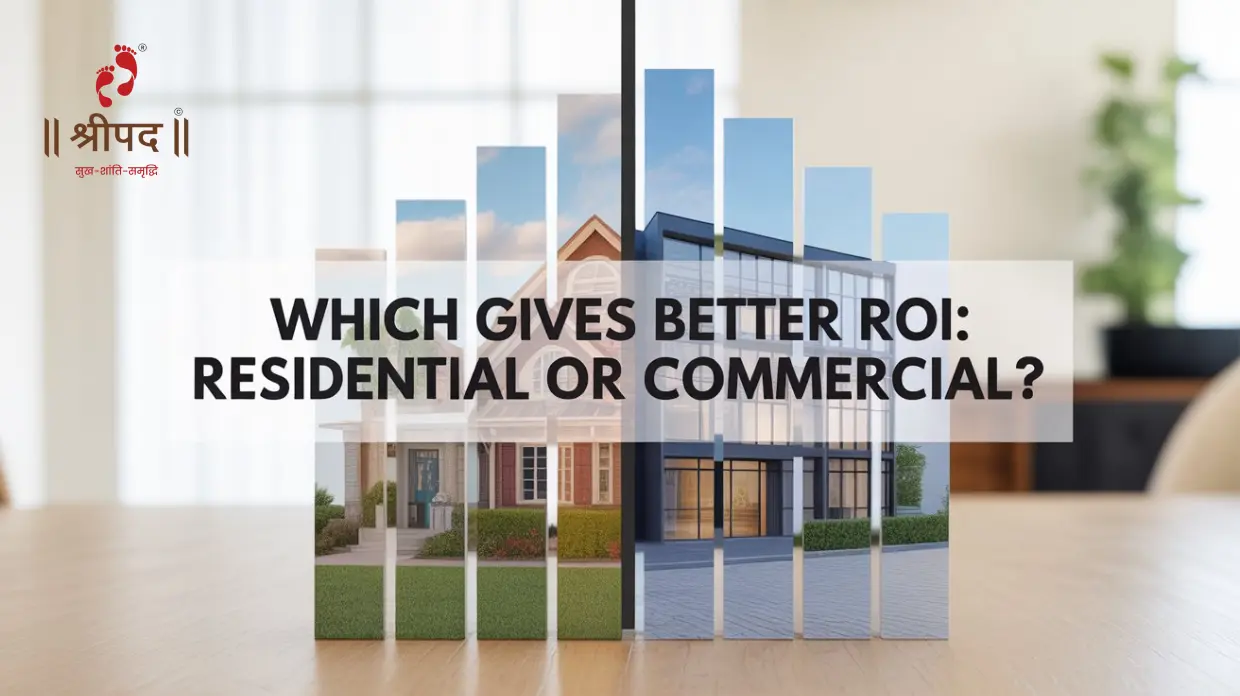- SHREEPAD GROUP
-
+91 83476 68000

Real estate continues to be one of the most reliable avenues for wealth generation. But when choosing between residential and commercial real estate investments, which one offers a better return on investment (ROI)? The answer isn’t straightforward—it depends on your budget, risk appetite, and financial goals. For a deeper dive, start by understanding the difference between residential and commercial properties to make an informed choice.
This blog explores the critical differences between the two real estate categories to help you make an informed investment decision.
Understanding ROI in Real Estate
In simple terms, Return on Investment (ROI) is a measure of profitability, expressed as a percentage of what you earn relative to your investment cost. It is commonly calculated as:
ROI = (Net Returns / Total Investment Cost) x 100
This figure helps investors evaluate how well their property is performing financially.
A Quick Comparison: Residential vs. Commercial
Residential and commercial properties differ significantly in structure, function, and investment dynamics. Residential real estate typically includes apartments, villas, bungalows, and similar housing units designed for individuals and families. These properties are usually rented out to private tenants under short-term lease agreements, generally lasting between six to twelve months. Commercial real estate, on the other hand, encompasses spaces like retail shops, office buildings, warehouses, and showrooms. These are leased to businesses or organizations, often under long-term contracts spanning three to ten years or more.
From an investment perspective, residential properties tend to have a lower entry barrier in terms of capital requirement, making them more accessible to first-time investors. Commercial properties, while requiring higher initial investment, often deliver better rental returns and income stability due to their longer lease periods.
When it comes to maintenance, residential landlords are usually responsible for upkeep and repairs, whereas in many commercial leases, tenants take on these obligations—especially in triple net lease agreements. Risk levels also vary: residential investments are typically considered lower risk due to constant housing demand, while commercial investments come with moderate to high risk, influenced by business cycles and economic conditions.
Advantages of Residential Property Investment
Lower Capital Requirement
Residential units are more affordable than commercial properties, making them ideal for first-time or small-scale investors.
High Demand Stability
There’s always a demand for housing, especially in growing urban centers like Surat. This ensures a stable source of rental income and consistent value appreciation.
Ease of Financing
Banks often offer attractive interest rates and repayment options for residential loans. Government-backed schemes also make financing accessible.
Better Resale Opportunities
Homes generally have higher liquidity in the market compared to commercial units, leading to quicker sales and cash flow.
Capital Appreciation
Properties in strategic locations tend to grow in value over time, generating wealth through long-term holding.
Disadvantages of Residential Properties
Lower Rental Returns: Rental yields in the residential segment are modest compared to commercial spaces.
Frequent Tenant Turnover: Short-term leases result in periodic vacancies.
Landlord Responsibilities: Property upkeep and repair expenses usually fall on the owner.
Why Invest in Commercial Real Estate?
Superior Rental Yields
Commercial properties can yield anywhere between 6% and 12% annually, significantly higher than residential assets.
Stable Long-Term Leases
Business tenants typically sign longer contracts, reducing vacancy risks and offering steady cash flow.
Reduced Operational Costs
Commercial tenants often handle taxes, insurance, and maintenance (via triple net leases), reducing the landlord’s overhead.
Professional Tenants
Businesses are usually more reliable and responsible in property maintenance.
Drawbacks of Commercial Investment
High Initial Investment: Entry costs are significantly higher, particularly in prime areas.
Sensitive to Economic Changes: During recessions or market downturns, businesses may close or relocate, affecting occupancy.
Requires Professional Management: Handling leases, contracts, and tenant relations often requires third-party property management.
ROI Face-Off: Which Performs Better?
Let’s examine the typical ROI for each:
Rental Income
- Residential: 2%–4%
- Commercial: 6%–12%
Capital Gains
Both property types can appreciate depending on demand, development, and location—especially in fast-growing cities like Surat.
Vacancy Period
- Residential: Typically shorter gaps between tenants.
- Commercial: May take longer to lease if vacant.
Costs & Expenses
- Residential: Owners bear the costs.
- Commercial: Costs are often shared or tenant-covered.
What Influences ROI in Property Investment?
Location, Location, Location
Whether it’s a home or office space, a strategic location near transport hubs, business districts, or schools significantly enhances value and rental potential.
Economic Trends
Knowing whether your city is witnessing growth in commercial demand or residential population boom will guide your investment direction.
Tenant Quality
Reliable tenants reduce risk and maintenance issues. Businesses often come with financial security; families offer stability.
Government Policies
Laws, taxes, subsidies, and reforms such as RERA impact rental returns and resale values.
Which Investment Suits You?
Choose Residential if:
- You’re new to real estate investing.
- You want consistent long-term appreciation.
- You have a limited budget.
- You prefer fewer management hassles.
Go for Commercial if:
- You seek higher monthly income.
- You can afford a larger upfront investment.
- You have the experience or resources to manage properties.
- You’re ready for a long-term financial commitment.
Can You Combine Both?
Absolutely. Many investors adopt a hybrid approach:
- Invest in a residential unit for long-term gains.
- Buy a commercial shop or office for immediate income.
This strategy balances capital growth and cash flow while spreading out risk.
Surat’s Real Estate Boom: A Goldmine for Investors
Surat is rapidly transforming into a smart city, powered by:
- A flourishing textile and diamond industry.
- High-quality infrastructure development.
- Expanding IT zones and business parks.
- Increasing demand for both homes and workspaces.
These factors make property investment in Surat highly lucrative, with solid ROI potential across both commercial and residential segments. To understand the unique advantages commercial properties offer in this growing market, learn more about why to invest in commercial property in Surat.
Make the Smart Move with Shreepad Group
Whether you’re planning to invest in an apartment or a retail showroom, Surat offers unparalleled opportunities for wealth creation through real estate.
If you’re ready to explore high-ROI opportunities, check out top-rated commercial properties in Surat and premium residential properties in Surat with Shreepad Group — your trusted partner to buy property in Surat.
With decades of real estate expertise, Shreepad Group brings you premium developments in Surat’s most promising locations, helping you make smart and secure investment choices.
Conclusion
Both residential and commercial properties offer attractive returns—but in different ways. If you prefer predictable growth and a more hands-off experience, residential real estate might suit you best. On the other hand, if you’re chasing high rental yields and are willing to manage complexities, commercial real estate could be your winning move.
In either case, investing in Surat’s thriving real estate market through a reliable developer like Shreepad Group is a step toward profitable and future-ready property ownership.
See Related News & Insights Blog

21.07.2025
Tips to Negotiate the Best Price When Buying Property
Purchasing property is one of the most significant financial investments a person can make. Whether it’s your first home or...

25.06.2025
A Complete Guide to RERA Guidelines for Residential Property in Surat
The Indian real estate industry has witnessed a significant transformation with the implementation of the Real Estate (Regulation and Development)...

20.06.2025
How to Choose the Right Residential Property in Surat
Surat, famously known as the “Diamond City of India,” has rapidly transformed into a booming real estate destination. With its...

22.05.2025
Understanding the Difference Between Residential and Commercial Properties
Real estate is a multifaceted sector that caters to a wide array of needs, from personal living spaces to profit-driven...
